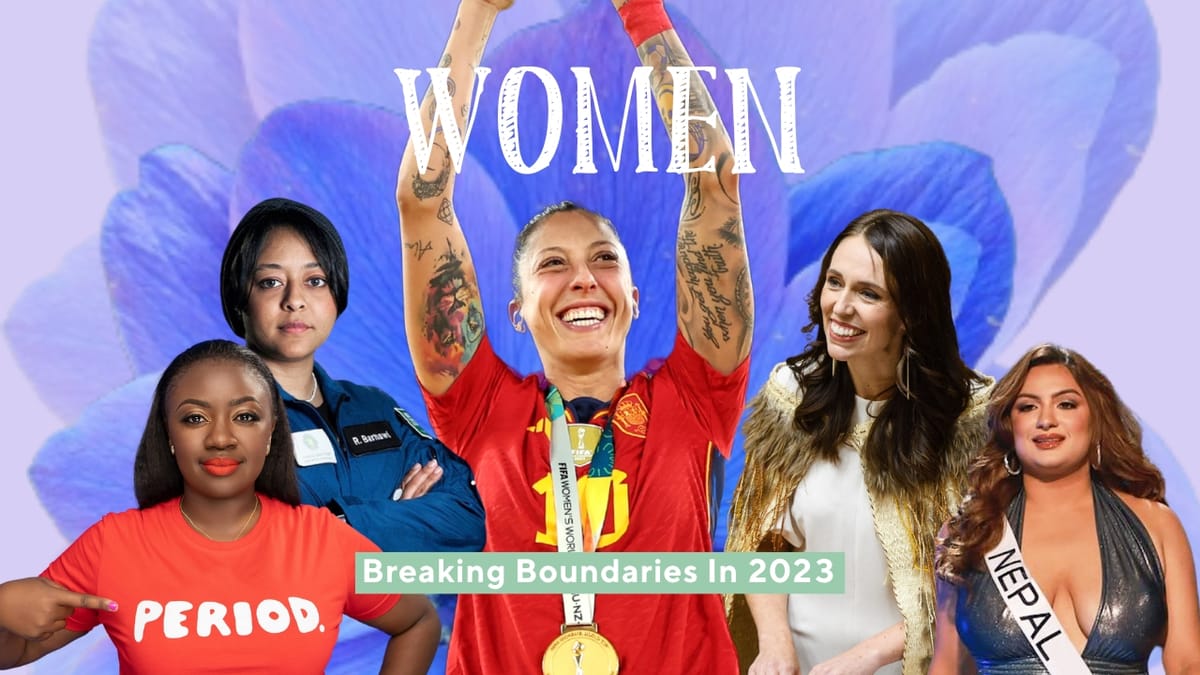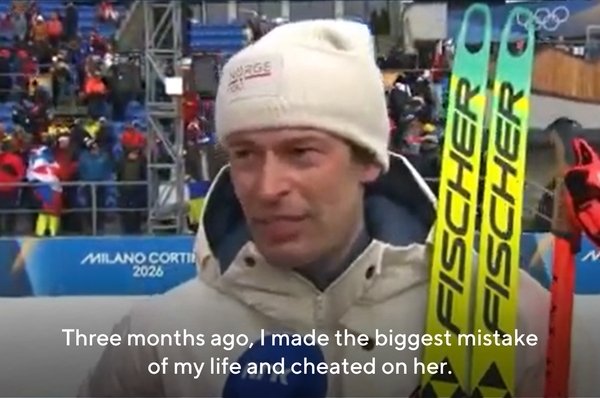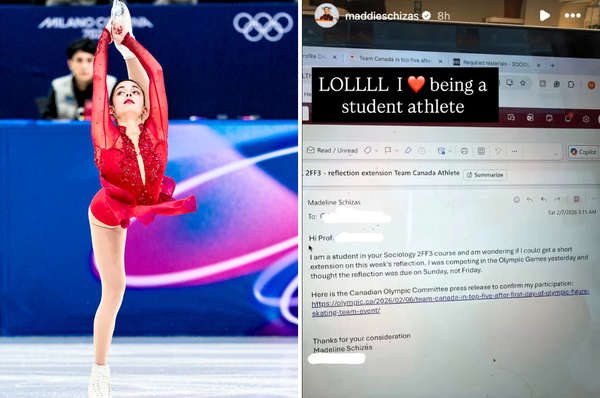15 Inspiring Women You Should Know About In 2023
Women are unstoppable.

Here are all the inspiring women you should know about in 2023.
1. Former New Zealand prime minister Jacinda Ardern showed the world that leaders can be kind but strong
Jacinda Ardern, who announced her resignation, showed the world throughout her five and a half years as prime minister that true leaders can be kind but strong – and know when it’s their time to go.
“I believe that leading a country is the most privileged job anyone could ever have, but also one of the more challenging,” Ardern said. “You cannot and should not do it unless you have a full tank, plus a bit in reserve for those unexpected challenges.”
“I know what this job takes, and I know that I no longer have enough in the tank to do it justice. It is that simple,” she added.
Ardern, who became the youngest world leader at age 37 in 2017, has led New Zealand through a terrorist attack, a major volcano eruption and the COVID-19 pandemic and is something of an international icon.
She had a daughter while she was in office – the second world leader to ever do so – then proceeded to make history by becoming the first world leader to take maternity leave and bringing her daughter to the United Nations.
She went onto gain widespread praise for her compassionate but firm response to the Christchurch terrorist attack in 2019, when a gunman opened fire in a mosque and killed 51 people.
“This has been the most fulfilling five and a half years of my life. But it has also had its challenges,” she said. “But I am not leaving because it was hard. I am leaving because with such a privileged role comes responsibility – the responsibility to know when you are the right person to lead, and also, when you are not.”
2. Kenyan politician Gloria Orwoba went to parliament with a period stain to protest period poverty and stigma
On Tuesday Feb. 14, Orwoba arrived at the parliament in a white trouser suit that had a visible red stain in the crotch area.
Several senators then interrupted the parliamentary session to protest her “inappropriate” dress code, with some calling it “indecent”.
The speaker eventually asked her to leave the building and change before she could reenter.
Instead of changing, she then visited a school to distribute sanitary pads.
Orwoba has been pushing for a bill for free sanitary pads for people who can’t afford them – known as period poverty.
The period stain – which was actually artificial coloring – had been a part of her efforts to raise awareness around the issue.
3. Michelle Yeoh made history as the first Asian woman to win a Best actress Oscar
The 60-year-old took home the award for her portrayal of Evelyn Wang, a Chinese-American mother in “Everything Everywhere All At Once” at the 95th Academy Awards on Sunday March 13 at the Dolby Theatre in Los Angeles, California.
This is Yeoh’s first Oscar nomination, and her win makes her the second woman of color to have won Best Actress after Halle Berry for “Monster’s Ball” in 2002.
“For all the little boys and girls who look like me watching tonight, this is a beacon of hope and possibilities. This is proof that dreams do come true,” Yeoh said in her acceptance speech.
“And ladies, don’t let anyone tell you that you are past your prime,” she said.
She also paid tribute to her mom, as well as all mothers.
4. The Spanish woman football team won the 2023 Women’s World Cup for the first time, while also starting a global conversation about consent
Spain beat England 1-0 to win the 2023 Women’s World Cup in Sydney, Australia, on Sunday Aug. 20.
The winning goal came during the first half from Spain’s captain Olga Carmona during the 29th minute.
With its win, Spain joins Germany as one of two countries to win both a men’s and women’s World Cup.
Following the win, a video showed Spanish football federation kissing Spanish soccer player, Jennifer Hermoso, on the lips after Spain won the Women’s World Cup.
Six days after the incident, FIFA suspended Rubiales for 90 days.
However, people felt that this was not enough and took to the streets in a huge protest on Aug. 28 to call for Rubiales to resign and in solidarity with Hermoso and Spain’s Women’s National Football team.
In September, Rubiales finally resigned.
5. Jailed Iranian woman activist Narges Mohammadi was awarded the Nobel Peace Prize
51-year-old Narges Mohammadi has spent the last 30 years pushing for peaceful change in the country.
She has campaigned for Iran to end to the country’s mandatory hijab law, violence against women, and the death penalty.
She is currently serving 10 years in prison in Tehran for several charges, including “spreading anti-state propaganda”.
Despite this, she has continued her work from inside prison.
Mohammadi organized prison protests in support of Mahsa Amini, wrote a book about Iran’s treatment of prisoners and held workshops for women inmates about their rights.
On Friday Oct. 6, Mohammadi was awarded the 2023 Nobel Peace Prize for “her fight against the oppression of women in Iran and her fight to promote human rights and freedom for all”.
6. Miss Universe Thailand wore a dress made of used soda can tabs as a tribute to her garbage collector parents
Miss Universe Thailand Anna Sueangam-iam paid a meaningful tribute to her garbage collector parents at the Miss Universe 2022 pageant by wearing an upcycled dress made from used pull tabs from soda cans.
“This gown was inspired by the familiar surroundings of my childhood,” Sueangam-iam wrote on Instagram. “Growing up with garbage collector parents, my life as a child was among piles of garbage and recyclables.”
“This unique gown was purposefully tailored-made with discarded and recycled materials, namely the ‘Can Tab’ to present to the UNIVERSE that what’s considered worthless by many actually possesses its own value and beauty,” she wrote.
7. Jane Dipika Garett became the first plus-size woman to participate in the Miss Universe pageant as Miss Nepal
The 23-year-old nursing student from Nepal’s capital Kathmandu took home the crown of Miss Nepal in September and represented her country at the Miss Universe pageant in El Salvador in November.
Garett emerged as a fan favorite, becoming one of the most applauded women on stage during the Miss Universe preliminaries, according to local newspapers.
She is an advocate for mental health and body positivity, saying that all women deserve to be represented in the fashion and beauty industry.
She also speaks openly about having polycystic ovary syndrome, or PCOS, a condition that causes hormone imbalance and irregular periods.
5. Sheynnis Palacios made history as the first Nicaraguan to win Miss Universe and became a symbol of hope
23-year-old Sheynnis Palacios won the beauty pageant in a dress inspired by the Nicaraguan flag, which depicts blue and white stripes and the country’s coat of arms at the center.
Her victory was celebrated throughout the country and led people to take to the streets waving the Nicaragua flag.
But actually, raising the Nicaraguan flag is seen as a symbol of resistance in the country and has not been done en masse in a long time.
Activists are calling Palacios’ win “a beacon of unity and hope” for the country, which has been living under a dictatorship for 17 years.
She dedicated her win to “all the girls around the world, her inner child, her family, and her country’s more than 6 million people.”
6. Inspired by a Netflix show, Taiwanese woman Chen Chien-jou said she was sexually harassed by a filmmaker and started the country’s first #MeToo movement
On May 31st, a former staff member from Taiwan’s ruling Democratic Progressive Party (DPP) said in a Facebook post that she had been sexually harassed while working for the political party in September 2022.
After months of trying to forget the incident, Chen Chien-jou (陳汘瑈) said she eventually found the courage to speak out after being inspired by a young woman character in the recent Taiwanese Netflix show Wave Makers, which follows a group of political staff members during election season in Taiwan.
Following the post, more than a dozen of women in Taiwan came forward with stories of sexual harassment, sparking the country’s first #MeToo movement.
This is the first time victims have actively come forward to share their experiences, despite previous #MeToo marches.
7. Women wrestlers in India said they were sexually harassed by a top official, sparking a conversation about gender violence in the country
The women wrestlers, including Olympic medalists, say Brij Bhushan Sharan Singh sexually harassed seven women wrestlers over more than ten years.
Singh, who is also a member of parliament for the ruling Bharatiya Janata party (BJP), has denied the allegations.
Sakshi Malik, the first Indian woman to win a medal for wrestling at the Olympics, said she and other women wrestlers had tried to file a police complaint against Singh in 2012 but the case “disappeared within 24 hours”.
In January, the group of women went public and began a protest in the capital. The women said the sports ministry then told them it would organize an investigation committee, but they were not informed of any progress for months.
In April, the women decided to relaunch their protest by camping on the streets of New Delhi, forgoing their rigorous training regimes with just a few months to go until the World Championships and the Asian Games.
Alongside their supporters, the wrestlers slept on mattresses and under mosquito nets, withstanding extreme weather conditions and alleged use of force by police.
“We have staked everything that we have – our careers, our reputations, even our lives – in order to raise this issue,” Malik told the Guardian. “We are not raising this just for ourselves, it’s for all the girls who have faced harassment from powerful men and haven’t been able to speak out.”
8. Japanese woman soldier Rina Gonoi sued three male colleagues for sexually assaulting her and won
24-year-old Rina Gonoi said that she had wanted to join the army as a child after she saw troops helping victims of an earthquake and tsunami in 2011.
In August 2021, three male colleagues pinned her to the bed, forcibly spread her legs open and rubbed their crotches against her sexually.
Gonoi said she reported the incident to senior officers but they dismissed her over “lack of evidence”.
After no action was taken, Gonoi eventually decided to leave the military.
In 2022, she took the rare step to go public and share her story on YouTube, drawing attention worldwide and in Japan, where speaking out against gender violence still remains a taboo.
Gonoi then sued the three men, who were found guilty on Tuesday Dec. 12 and sentenced to two-year suspended prison sentences.
9. Rayyanah Barnawi, a Saudi woman scientist, became the first Arab woman to go to space
Rayyanah Barnawi became the first Arab woman astronaut to go to space as part of a private Saudi mission that took off from Florida, USA, to the International Space Station (ISS) on May 21.
The 34-year-old scientist went on a 10-day mission as part of Axiom Space’s second private voyage to the ISS and is joined by three other crew members, including fellow Saudi Ali al-Qarni, a fighter pilot.
During the mission, the crew conducted more than 20 science and technological experiments, including studying the repercussions of space on human health and rain-seeding technology, according to the BBC.
Barnawi, who has dedicated almost a decade to stem-cell research, focused on studying stem cells and breast cancer during the mission.
10. Women in Iceland, including the prime minister, skipped work to protest against the gender wage gap and gender violence
Thousands of Icelandic women staged the country’s first full-day women’s strike in 48 years to protest against gender pay gap and gender-based violence on Oct. 24, with Prime Minster Katrín Jakobsdóttir joining them.
Under the slogan “Do you call this equality?”, the nationwide walkout marks the seventh women’s strike and the first full-day event in Iceland since 1975, when about 90% of the country’s women workforce refused to work to raise awareness about women’s crucial economic role in society.
The 1975 strike led to the enactment of a new equal pay law the following year.
Organizers of the “Women’s Day Off”, or “Kvennafrí” in Icelandic, called on tens of thousands of women, including immigrant women and non-binary individuals, to decline both paid and non-paid jobs, including house chores and childcare.
They also urged women to report employers who discouraged participation and threatened to disclose the names of companies involved.





